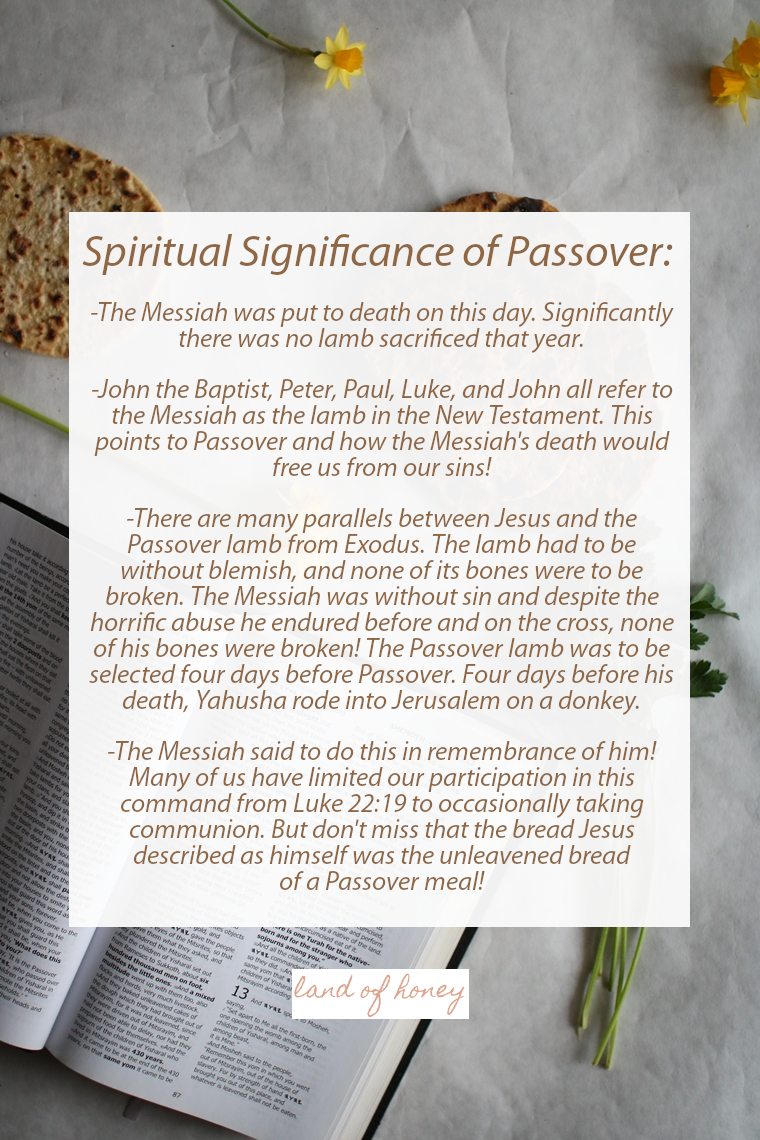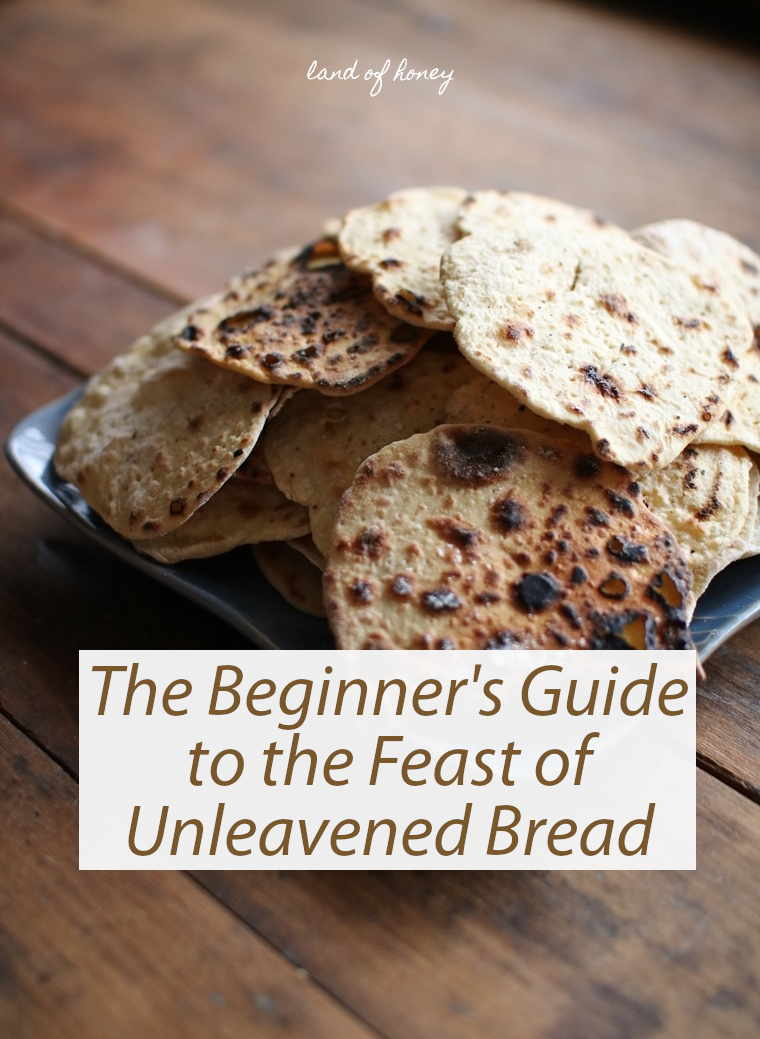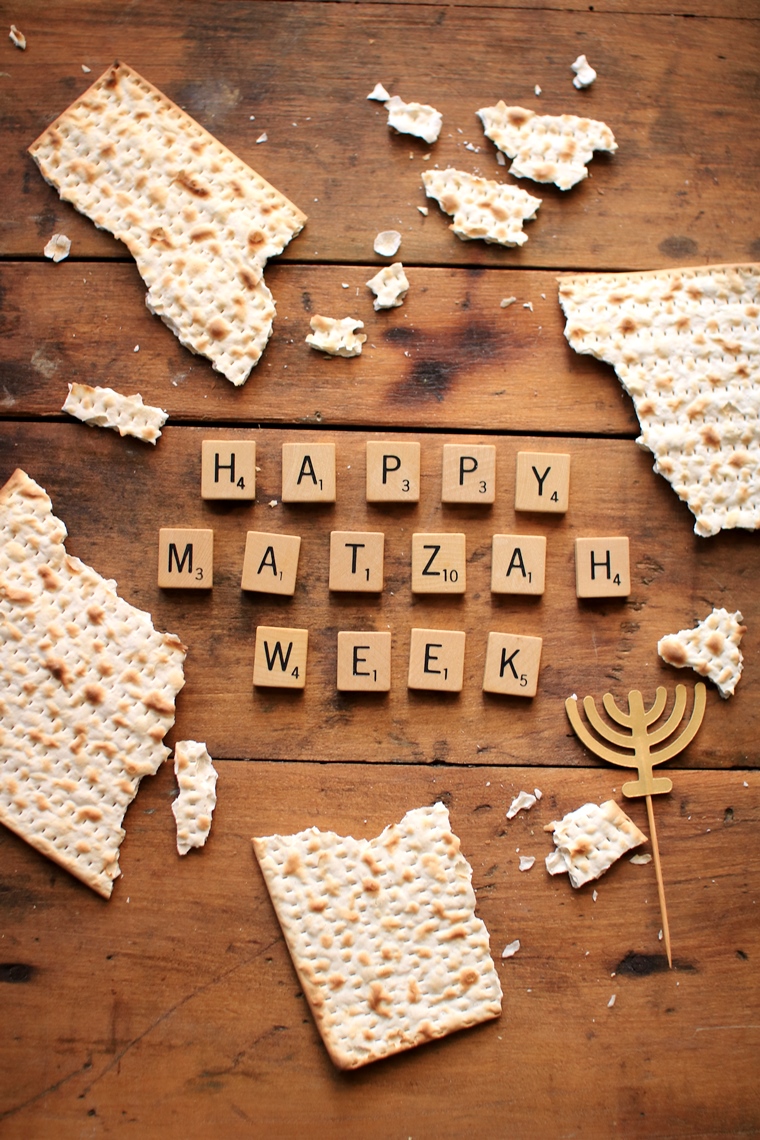Are you new to celebrating Passover and the other Biblical holidays? Are you wondering why to take part in Passover, when it is, what the Bible says about it, or who should celebrate it? This post will go over the details for you and make observing this time doable and spiritually meaningful as a believer in Messiah.
Where in the Bible is Passover?
Exodus 12 gives us many details about Passover, when God was working through Moses to lead the Israelites out of slavery in Egypt. The climax of the Exodus story is about the Passover lamb and the death of the firstborn plague not bothering the people who had followed YHWH's instructions.
Matthew 26, Mark 14, Luke 22, and John 13 talk about the Messiah's last supper and then his crucifixion...which happened on Passover!
There are other mentions of Passover throughout the Old and New Testaments! Joshua and the Israelites kept Passover before the battle of Jericho. Kings and Chronicles record mentions of Passover celebrations. Mary and Joseph kept Passover when Yahusha was young. The Gospels and books of Acts, 1 Corinthians, and Hebrews all mention Passover. Some scholars believe that when Abraham and Sarah served unleavened bread and meat to their heavenly visitors they were observing Passover.
Why is Passover celebrated?
Passover is celebrated because it is one of the seven Biblical holidays that the Living God expressly told his people to celebrate in Leviticus 23, Numbers 9, and Deuteronomy 16. Passover celebrates the miracles of the Exodus story when YHWH spared his people from the plagues against the Egyptians and freed them from slavery. For believers in Messiah, Passover is also when we make a special point of remembering and honoring the Messiah's sacrifice for our sins.
What does Passover mean?
Passover comes from the Hebrew word 'Pesach,' the root word of which means pass-over. This comes from the angel of death 'passing over' the homes of the people who had slaughtered a lamb and put its blood around the door to their homes in the Exodus story. Doors that had not been covered with the blood of the lamb resulted in the firstborn dying in each house/family. This was the tenth plague YHWH brought upon Egypt, and after the death of his son Pharaoh decided to let the Israelites go.
Are Passover and Easter the same?
No. Even though there are many well-intentioned people who believe that Easter celebrates the same thing as Passover, there are many differences between these holidays. For believers in Messiah, Passover focuses on the death of the Messiah and his sacrifice covering our sins, and his resurrection is celebrated a few days later on the Biblical holiday of First Fruits. The holiday of Easter does not have its root in Scripture, and is not mentioned by the Bible. Many Easter traditions and customs are also not from the Bible, such as the ubiquitous Easter bunny. Scripture emphasizes the Passover lamb. Those who currently celebrate the resurrection of the Messiah at Easter would do well to start following the Living God's instructions about this!
Who should celebrate Passover?
All Bible believers should take part in Passover and the other Bible holidays! No matter our ancestry, Scripture instructs all of God's children to take part in this special time. It is mentioned throughout the Old and New Testaments; Moses and Apostle Paul both said that we should keep the feasts! Participating in the Biblical holidays will help us better understand the Bible from historical and prophetic perspectives.
What to know about Passover:
-Passover is a one day holiday, which is immediately followed by seven days of the Feast of Unleavened Bread.
-Passover is not a no-work day. This is likely because of the work of sacrificing and roasting a lamb that was required of believers in Exodus.
-Deuteronomy 16:3 says we eat the Passover meal of lamb, herbs, and unleavened bread to remember how quickly the Living God brought his people out of Egyptian slavery!
-The Hebrew word for Passover is Pesach and these words are used interchangeably.
-Passover happens around the same time as Easter, but the holidays are very different. One has its roots in Scripture, the other does not.
-We do not sacrifice a lamb today because the Messiah is the ultimate Passover lamb! However, serving and eating lamb is perfectly okay!
Spiritual significance of Passover:
-The Messiah was put to death on this day. Significantly there was no lamb sacrificed that year.
-John the Baptist, Peter, Paul, Luke, and John all refer to the Messiah as the lamb in the New Testament. This points to Passover and how the Messiah's death would free us from our sins!
-There are many parallels between Jesus and the Passover lamb from Exodus. The lamb had to be without blemish, and none of its bones were to be broken. The Messiah was without sin and, despite the horrific abuse he endured before and on the cross, none of his bones were broken! The Passover lamb was to be selected four days before Passover. Four days before his death, Yahusha rode into Jerusalem on a donkey.
-The Messiah said to do this in remembrance of him! Many of us have limited our participation in this command from Luke 22:19 to occasionally taking communion. But don't miss that the bread Jesus described as himself was the unleavened bread of a Passover meal!
How to observe:
-Remove the leaven from your home. Start with getting rid of breads or similar products made with sourdough starter, yeast, baking soda, or baking powder. Don't forget any containers of breadcrumbs or products made with breadcrumbs such as meatballs, or breaded chicken.
-Plan a meal using lamb, unleavened bread, and herbs. While traditional Passover Seders can be daunting, it's okay to keep things simple! It can be just yourself, or invite family and friends to honor this time with you.
-Have communion. Use unleavened bread and grape juice or wine to pause and give thanks for the Messiah's sacrifice.
-Read, tell, or watch the accounts of the Messiah's last supper and death, as well as the Exodus story.
-Remember the miracles and faithfulness of YHWH in your own life. Scripture repeatedly instructs us to remember the works of YHWH and I think that applies to our own experiences outside of the Bible. Sharing how you have seen the Living God's provision and encouragement in your life is a great way to spread hope to others, as well as yourself!
There is some learning curve when you start to observe a new holiday, so give yourself grace about that. It takes time to get used to celebrating the times of the Creator and next year it will seem more natural and be even more fun! The Living God is honored by your efforts to take part in his set apart times!
More about Passover:
What the Bible Says About Passover
Differences Between Passover and Easter
How to Host a Passover Seder
Five Reasons Believers Should Keep Passover



















.JPG)

